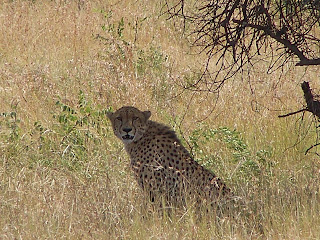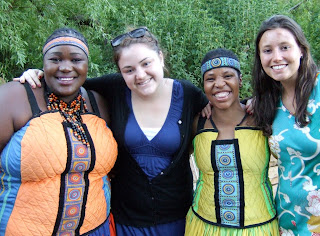Friday, April 30, 2010
mo jazz please
Over 70,000 people (or so they say) attend the Cape Town International Festival each year. The Convention Center hosts a two-night festival with six stages and over 40 artists, from Cape Town, from Africa, Sweden, India..everywhere. I bought my ticket well in advance which was lucky because both nights sold out. People pulled up in limos and hired cars, wealthy Africans dressed to the nines, flashing jewellery worth more than my savings account. I went with my friend Jade, a UCT saxophone star herself, and we spent the nights chasing down band after band. Sunday night I was dreaming in jazz, I kid you not.
Highlights from the festival:
1. The Bad Plus – from my darling Minneapolis, they were everyone’s highlight and one of my favorite groups ever. My friends are still talking about it, thanking me for forcing them to go. If you haven’t heard their covers (think Rush, Radiohead, Aphex Twin, Nirvana) please listen to them now. www.thebadplus.com
2. Regina Carter- she’s an American violinist who played with a man on the Kora, an African string instrument, and a jazz accordion. We were floating
3. Charles Lloyd- saxophone. Legendary
4. Marcus Wyatt and the Language 12 – former UCT student on the trumpet. He played with Language 12, including a fabulous vocalist who sang in Xhosa. We were still floating
5. Kesivan & The Lights: Instigators of a Revolution – These guys are young, spunky, Cape Town jazz. They played with Feya Faku (legend!) and guests from Europe. So good I went and saw them again on my birthday the next week
6. Melanie Scholtz- South African vocalist. Sultry and delicious. Mmm
7. Makeson Brown and Akoustik Knot: more young feisty Capetonians, they play at a bar near my house sometimes. It's amazingly good.
Ok I could go on and on. Anyway the jazz here is wonderful. South African musicians have struggled for a long time with bans and stigmatism because of political issues and anti-apartheid protests. Now that South Africa is big in the world again, it’s a great opportunity for music to mix. It’s really interesting because there’s all different styles: Cape Jazz, South African jazz, African jazz, modern jazz… the awesome thing about this festival was seeing everything and everyone combining and celebrating and blowing my socks off. Jade is also a great musician and one morning hosted a giant pancake breakfast for her musician friends and her nonmusician friends to chow some delicious food and talk music. It was fun jumping into their world for a day and eating whipped cream and chocolate for lunch is never a bad idea.
I only have a little over a month left in SA and I’ve still got so much of South Africa to explore. And things are getting so hectic with preparations for the World Cup. Construction projects are frantically being built, cities are panicking, trying to clean up the streets. Cape Town is working on a mega transportation system to get fans to and from the games. It’s chaotic. I’m not sure how it will all pan out but it will be interesting to watch. I keep having mixed feelings about the whole thing. It’s great that South Africa is finally on the map, entering the global arena, so to speak. But honestly I’m not sure they’re ready. Here’s an interesting article that should get you thinking:
http://www.abahlali.org/node/6566
And I didn’t even get to AfrikaBurn. Expect fun things next post! xoxomo
Monday, April 12, 2010
Overdue notice, please bill the fines to my parents, thanks

I’m excited to be writing this blog post! Everything has been happening all at once in classic student fashion. On days when I’m not out of the house exploring I’m trying, rather unsuccessfully, to write papers and do homework. I have a huge assignment due Wednesday but I’m a firm believer in mental health days, study dance breaks, and dark chocolate. To fill you in…
Fall break here was a whirlwind adventure. I spent the first half at a camp with my ecology class in the West Coast National Park. The area is chock full of ostriches. I’d never seen an ostrich out in the wild—it’s not something you really think about seeing—but they were so fun to see because they poke up over the bushes, very awkwardly, like they’re trying to hide but want to see if you’re coming. The camp was one of my favorite experiences in SA—I met so many fun people and got to unashamedly be the science nerd I really am inside. 60 of us students spent five nights bunking in converted stables in the park, about 2 hours north of Cape Town on the Atlantic Ocean. We’d wake up super early in the mornings and go out in small groups with professors to spend the day in the field doing research. In the afternoon we’d send someone to town for beer, and then at night we’d chow on fresh fish, make bonfires, play ultimate frisbee, bait the resident porcupine with peanut butter and cabbage, tell stories, drink boxed wine, spot shooting stars. Then we’d wake up and do it all over again. The projects were neat because the data we collected will actually be published some time. I spent a day collecting mussels and anemones from tide pools, a day tramping around in the bush identifying plants, a day counting snails on the beach, and a day on a boat in the lagoon catching sharks. We’d pull these guys on board, measure them, take genetics samples, tag them, give them antibiotics to stain their growth rings and send them back. I ended up bringing three sharks in and doing the work all myself! Talk about hands-on learning..
I arrived home at 1 pm from camp that Wednesday, showered, ate, repacked and woke up again the next morning at 4 am for my flight to Johannesburg and my tour to Kruger. I went by myself which was actually quite nice. There was another American UCT student there with her family so they bought me lunch and let me hang out with them so I wasn’t super lonely. Kruger was phenomenal. I did have a pretty generous zoom on the camera I borrowed, but still. To be in a park the size of Israel without fences in between you, the animals, the other animals—just things surviving as they have for thousands of years. From an ecological standpoint it’s so incredible. At one point we came upon a fresh lion kill. The lions weren’t there, but the vultures were digging in, so excited to finish it off. Someone kept referencing everything back to Lion King, which was strangely applicable. The whole circle of life motif…
Things have kept happening since then—jazz, birthdays, political events, jazz..but it will have to wait. So will my paper it looks like… Hey, well, you know what they say…hakuna matata :)

Wednesday, March 31, 2010
a walk in the (kruger national) park


 my tent! the walls unzipped so they were only mesh. i had many visitors. sometimes they were frogs. sometimes spiders. sometimes they ran across my legs. you know, just to say hello.
my tent! the walls unzipped so they were only mesh. i had many visitors. sometimes they were frogs. sometimes spiders. sometimes they ran across my legs. you know, just to say hello.




 epic. we parked next to this water hole and watched a hippo and a crocodile hang out. some giraffes started fighting. birds flew around. then, all of a sudden, all of these buffalo arrived to join the party. it was incredible. ask to see some videos when i see you next.
epic. we parked next to this water hole and watched a hippo and a crocodile hang out. some giraffes started fighting. birds flew around. then, all of a sudden, all of these buffalo arrived to join the party. it was incredible. ask to see some videos when i see you next.





thanks josh for lending me your camera!
Thursday, March 11, 2010
it's still lekker, really lekker

so i left for Cape Town pride on saturday covered in face paint, sunscreen, water, jacket, money in my black bag. and i had an ingenious plan. i'd tie the strap of my camera to my bag with a lanyard. that way, if someone stuck their hand in my bag and tried to pull it out, i'd realize, and catch them and be a hero. well, i ended up home sans shoes, flipfops, water. and a lanyard tied to a camera strap that had been cut. argh. but, oh well. thats the kind of thing where you say 'shame' and then go back to the party anyway.
some good habits I've adopted and maybe some not so good ones:
- attending the summer concerts at Kirstenbosch. Goldfish was amazing. the venue is amazing. nough said.
- J-walking. look right. cross to center line. stay really skinny. look left. run like hell.
- shopping early. liquor stores close at 5. wow
- hiking partway up Devils Peak to Rhodes Memorial before class. its great to start your day with a beautiful view and hideous sweat stains
- buying produce from the guy who comes buy with a truck packed with veggies on tuesdays at 6pm. your total is either 35 or 40 rand, depending
- stopping at the student pub after class for a savannah dry with lemon, and maybe a rugby game, if it's on
- swimming between classes in the outdoor pool at the gym
- responding to 'sister' and 'baby', responding with 'love', 'bru' and a smile or two
- walking to class barefoot, but only when its cloudy
Thursday, March 4, 2010
you haven't seen anything...
 ...until you've shared the love with Soweto Gospel Choir, danced, sang and celebrated in the Kirstenbosch National Botanical Gardens while the sun sets behind Devil's Peak. heartfelt, amazing, joyous. get your fix: http://www.sowetogospelchoir.com/VIDEO.html
...until you've shared the love with Soweto Gospel Choir, danced, sang and celebrated in the Kirstenbosch National Botanical Gardens while the sun sets behind Devil's Peak. heartfelt, amazing, joyous. get your fix: http://www.sowetogospelchoir.com/VIDEO.html
the opening reggae band was equally fabulous. Devil's Peak and Table Mountain are in the background. mmm

Saturday, February 27, 2010
Spaces
 the land around Camps Bay used to belong to black Africans. During Apartheid residents were moved to townships as a part of the forced removal policies instated by the government
the land around Camps Bay used to belong to black Africans. During Apartheid residents were moved to townships as a part of the forced removal policies instated by the government

The main taxi station in central Cape Town--combi minibuses are by far the most convenient and cheapest form of transport

champagne, gourmet sandwiches, homemade pizza, sushi, handmade jewlery and white people at the Old Biscuit Mill farmers market

To get into the city from the townships blacks and coloureds road the trains to work during Apartheid. Most of them still do. I walk under the train tracks everyday on my way to class. Sometimes when the train stops whole cars of people will be singing hymns in Xhosa. Going to work has never been this beautiful.
Monday, February 22, 2010
How many more? We say: Enough

I debated for a while if I would post about this. Crime is South Africa's most talked-about issue, but one I usually like to ignore. Africa as a whole is always talked about so negatively. Little attention is given to the many brilliant scholars, doctors, scientists, theorists, musicians, artists, writers, etc. that come from the continent. I got countless warnings about safety before I came here. I listened closely but mostly, I blew them off. I was a confident, bright, self-sufficient young lady. I've been the victim of an armed mugging before. I mean, I lived in Lima. I didn't think twice about crime here, I was confident I'd just take it all in stride as I do most things, safe but sure.
However, I've definitely been struggling with bouts of fear and anxiety lately. Many international students I know have already been mugged, houses have been broken in to, my roommate was robbed on his way home from class, I was followed by a man who tried (unsuccessfully) to take my bag. Things to make you nervous, things that have cause me to take extra precautions, splurge for extra cab fares, never walk alone. But the news that a UCT student was brutally murdered last week on the very road I cross every day to get to school was shocking. It's one thing to mug tourists, to steal from the rich. But murder in cold blood is vicious and frightening. Where are the solutions? No one knows. UCT is trying to set up specially policed zones for the places around campus where students like me and my housemates walk around, but the police here aren't very reliable. It's such a complexly layered situation. There are so many poor and they are so marginalized. They're looking for money, for food. They often carry knives and guns. Sometimes they're involved in gangs. But they are very rarely caught or punished.
Today, in response to the death of Dominic Giddy the university held a memorial service and a protest march along Main Road. I marched with hundreds of students, singing, chanting, carrying signs, to the spot in which he was murdered. Members of the community came out of storefronts and their places of residence to cheer us on and show their support. It was inspiring to see everyone united, all races and walks of life, singing together, sometimes in Xhosa, sometimes in English: How many more? Where is the love?
You can read more about the event here:
http://www.uct.ac.za/dailynews/?id=7258
and here:
http://mycapetown.co.za/news/2010/02/we-say-enough-uct-community-to-protest-the-murder-of-student-dominic-giddy/



Sunday, February 21, 2010
Wednesday, February 17, 2010
Imizamo Yethu: Our Collective Effort

I was talking to my friend Rachel today, while we were standing in the middle of a muddy road in a township, observing the progress of the mangiest dog either of us had ever seen, and I asked her if she’d been on a field trip like this with a class from back home. Neither of us could really think of any. But here we were, our second week of class, in the midst of a shanty town, observing processes of social change in conjunction with environmental degradation. We’ve been discussing systems theory—how environmental and social systems aren’t separate but codependent, and here we were in the middle of a such a system in disarray. It was fascinating, refreshing, and very real.
The township of Imizamo Yethu began as a group of shacks on the beach of Hout Bay, on the Atlantic. The rich residents of Hout Bay, mostly from Constantia, a town of wine estates and oversized homes, got upset with them there. So in 1992 550 families were picked up and moved to the side of the mountain, well above the beach, in a forested area. They’ve since grown to 38000 families packed in on a little plot of land. They’re having issues with soil erosion and water quality, constructing around boulders and trees, but the township grows every year as more and more people leave their homes in the Cape. It was inspiring to see all the businesses: there are 63 informal bars, several hair salons and shoe repair guys…all sorts of people creating a community that will never be officially recognized by anyone. But the people were lively, the colors were bright, there was music, beer, children. It’s strange to be in a township—on the one hand it’s great to learn and see and talk to people, but on the other it feels like exploitation, glorifying the experience of the poor for our own entertainment. Personally, I think you have to come face to face with poverty to get a good grasp on what’s going on. I can guarantee you most of the residents of Constantia had never smelled the sewage water in these street or that poor mangy dog. Yet here we were. Most of the residents here are Xhosa speakers, so as we walked around little kids ran up to us for high fives and to scream ‘Muzungu!’ excitedly at our faces. Yes, we know, we are white people.



The area used to be a landfill. This stormwater runoff goes down to the beach--one of the most polluted beaches in South Africa.

















